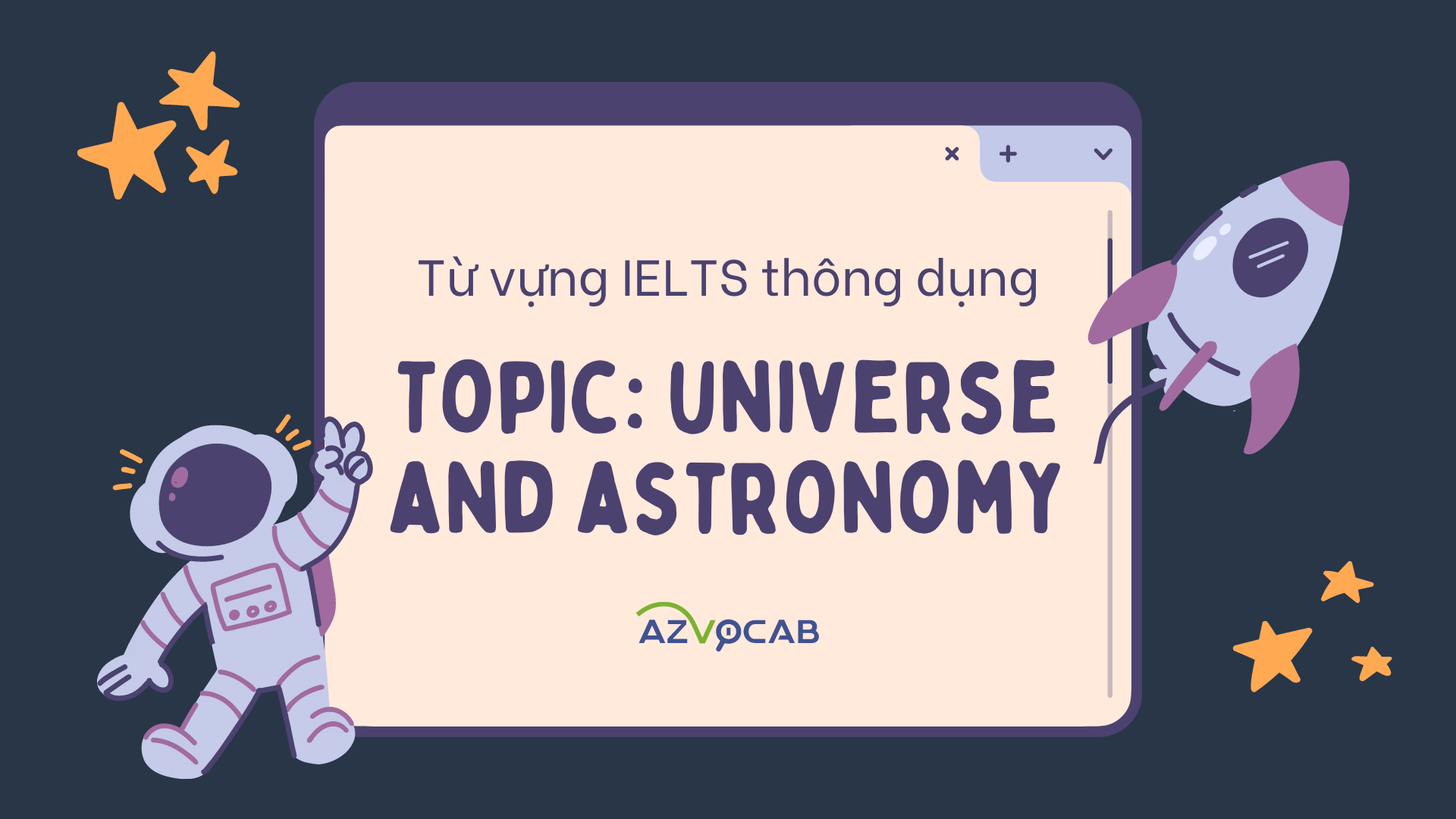50+ từ vựng chủ đề Universe and Astronomy thông dụng cho kì thi IELTS
24 November, 2022Từ vựng IELTS theo chủ đề

Từ những bộ sách hay nhất cho việc ôn thi IELTS, azVocab đã tổng hợp được hơn 50 từ vựng phổ biến nhất thuộc chủ đề Universe and Astronomy cho kì thi IELTS.
Các từ vựng này đều có thể sử dụng cho cả 4 kỹ năng Reading, Listening, Speaking và Writing. Những ví dụ được azVocab lựa chọn kĩ lưỡng trong từng ngữ cảnh cụ thể ở các bài thi IELTS. Điều này sẽ giúp các bạn biết cách sử dụng từ trong ngữ cảnh, tăng tính hiệu quả của việc học từ.
1. Từ vựng về Vũ trụ
| asteroid (n.) – thiên thạch | The asteroids, meteoroids and apparently all comets originated in the explosion of planets (or moons). |
| atmosphere (n.) – bầu khí quyển | CO2 plays a critical role in maintaining the balance in the Earth’s atmosphere and the air that we breathe. |
| cosmos (n.) – vũ trụ, thiên hà | Scientists can now create computerized models of the cosmos. |
| crater (n.) – miệng núi lửa | The surface of Venus also has many craters as a result of asteroid collisions. |
| debris (n.) – mảnh vỡ, mảnh vụn | Fortunately, the debris fell in mostly uninhabited areas and locals scrambled to collect a souvenir. |
| Earth (n.) – Trái đất | The Earth takes approximately 3651/4 days to go around the sun. |
| eclipse (n.) – nhật thực, nguyệt thực | A lunar eclipse occurs when the moon is hidden by the sun. |
| galaxy (n.) – ngân hà | The North Star is the brightest star in our galaxy. |
| meteor (n.) – sao băng | Many scientists believe that dinosaurs became extinct when a meteor hit the Earth. |
| moon (n.) – vệ tinh | We also know that Saturn has a large number of moons. |
| ocean (n.) – biển | On 11 July 1979, the Skylab eventually crashed into the southern ocean off Esperance. |
| orbit (n.) – quỹ đạo | Its low orbit gradually pulled the 77-tonne Skylab down towards the Earth making a crash landing inevitable and causing a great deal of concern around the world. |
| outer space (n.) – không gian ngoài vũ trụ | In outer space, there are many high-energy particles, and the irradiation is very intensive. |
| planet (n.) – hành tinh | Venus is unusual because it rotates in a different direction from the other planets orbiting the sun. |
| solar system (n.) – hệ mặt trời | On Mercury the temperature varies more than on any other planet in the solar system and, as it has no water, it is unable to sustain life. |
| space (n.) – không gian | Astronauts have been travelling in space for a long time now. |
| surface (n.) – bề mặt | The surface of the planet is covered in colossal volcanoes much larger than any on Earth. |
| universe (n.) – vũ trụ | Many people wonder if there is intelligent life elsewhere in the universe. |
| horizon (n.) – chân trời | The moon appears much bigger when it is close to the horizon. |
| cosmic (adj.) – (thuộc) vũ trụ | Through transforming the universe, astro ethics can have cosmic consequences. |
| burst (v.) – nổ tung | A meteor air explosion is a type of air burst in which a meteor burst after entering a planetary body’s atmosphere. |
| collide (v.) – va nhau, đụng nhau | Scientists believe that dinosaurs became extinct when a meteor collided with Earth. |
2. Từ vựng về Thiên văn học và khám phá vũ trụ
| astronaut (n.) – phi hành gia | The station, called Skylab, managed to carry three different crews of astronauts over a nine-month period, in spite of the fact that it lost a meteor shield on launch. |
| astronomy (n.) – thiên văn học | They used a system of symbols that represented words and syllables to record information about the deeds of their rulers as well as information connected to their calendar and astronomy. |
| exploration (n.) – sự thám hiểm | There are some important things that space exploration can teach us, especially about the history of our own planet and its atmosphere. |
| explorer (n.) – người thám hiểm | Our space explorer will be able to float around the cabin and view the Earth. |
| finding (n.) – kết quả; phát hiện | Satellites have recently sent back important new data from Mars. although it is not yet clear what significance the findings have for future space exploration. |
| gas (n.) – khí | Saturn has barely any solid surface, as its composition is mostly gas. |
| gravity (n.) – trọng lực | There the passengers will be able to experience zero gravity in a special simulator. |
| light year (n.) – năm ánh sáng | Astronomers suggest that orbiting around Sagittarius A*, 26,000 light years from Earth, maybe as many as tens of thousands of smaller black holes. |
| radiation (n.) – phóng xạ, bức xạ | I don’t think there will ever be a way to shield us totally from cosmic radiation. |
| rocket (n.) – tên lửa | During the flight itself, a rocket will propel the spacecraft into suborbital space in excess of 100,000m above the Earth’s atmosphere. |
| satellite (n.) – vệ tinh | There are currently approximately 8,000 pieces of space junk floating above our heads thanks to the satellites, space shuttles and space stations out there. |
| simulator (n.) – thiết bị mô phỏng | People learning to fly often practice on a flight simulator. |
| space shuttle (n.) – tàu con thoi | We know a lot more about Saturn nowadays, thanks to the Voyager space shuttle, which taught us a lot about the rings around Saturn. |
| space station (n.) – trạm vũ trụ, trạm không gian | Although there is an international space station, this is currently only involved in research. |
| spacecraft (n.) – tàu vũ trụ | Spacecrafts need to reach extremely high speeds in order to escape the gravitational pull of the Earth. |
| weightlessness (n.) – (trạng thái) phi trọng lực | Weightlessness can be a health problem for people working for long periods in space. |
| astronomical (adj.) – (thuộc) thiên văn, (thuộc) thiên văn học | The results predicted astronomical observations exactly and provided the first proof of his theory. |
| climatic (adj.) – (thuộc) khí hậu, (thuộc) thời tiết | Rotational instabilities would have caused dramatic changes in Earth’s climatic zones over time. |
| colossal (adj.) – khổng lồ, to lớn | The colossal rocket, however, may still need to roll back to Kennedy Space Center’s Vehicle Assembly Building. |
| commercial (adj.) – (thuộc) buôn bán; (thuộc) thương mại | If you have ever dreamed of traveling in space then our commercial space travel program will make that dream a reality. |
| gravitational (adj.) – hút, hấp dẫn (lực) | Careful measurements have allowed us to develop a thorough understanding of minute gravitational changes and given us the ability to accurately determine the past and future positions of the planets. |
| lunar (adj.) – (thuộc) mặt trăng | During this lunar cycle, many different phases of the moon are visible from Earth, even though the moon itself never changes shape. |
| meteoric (adj.) – (thuộc) sao băng | The sudden flash of light in the night sky was caused by a meteoric fireball. |
| repetitive (adj.) – lặp đi lặp lại | Though we see a slightly different moon from Earth each day, its repetitive cycle is both predictable and functional. |
| uninhabitable (adj.) – không thể ở, không thể trú ngụ, không thể cư trú | Perhaps we wouldn’t need to worry about the Earth being uninhabitable in a hundred years’ time. |
| unmanned (adj.) – không người lái | In February 1974, the final crew returned to Earth, and, for the next five and a half years, the Skylab continued to orbit the Earth, unmanned and unused. |
| vast (adj.) – rộng lớn, mênh mông, bao la | With the increasing use of satellites to monitor activities here on Earth, as well as the very real prospect of space tourism, now is a good time to ask who owns or, more importantly, governs the vast area of space above us? |
| acclimatise (v.) – làm thích nghi với khí hậu, môi trường | There the passengers will be able to experience zero gravity in a special stimulator, this will allow the passengers to acclimatise. |
| explore (v.) – khám phá | Most of our planet has already been mapped and explored, so it is not surprising that explorers turn their attention to other parts of the universe. |
| launch (v.) – phóng (tên lửa, vệ tinh…) | In May 1973, the USA launched its first manned space station. |
| orbit (v.) – đi vào quỹ đạo, đi theo quỹ đạo | On this mission, the Shuttle will orbit the Earth at a height of several hundred miles. |
| propel into/to/towards (v.) – khiến ai đó làm gì hoặc ở trong tình trạng nào | One of the most powerful rockets ever built, Nasa’s Saturn V rocket, propelled Apollo astronauts toward the moon. |
| rotate (v.) – làm quay, làm xoay quanh | Venus is unusual because it rotates in the opposite direction to other planets. |
| simulate (v.) – dựa theo, mô phỏng | This computer program simulates extremes of weather so that pilots can experience difficult flying conditions. |
| sustain (v.) – chống đỡ; duy trì | Mercury’s temperature varies more than on any other planet in the solar system and, as it has no water, it is unable to sustain life. |
| undergo (v.) – chịu đựng, trải qua | However, unlike the months of training that astronauts undergo, our passengers will be ready for launch within two days. |
Trên đây là từ vựng thông dụng chủ đề Universe and Astronomy cho kì thi IELTS, hy vọng sẽ giúp các bạn chinh phục chủ đề này một cách dễ dàng hơn. Hãy xem thêm những bài tổng hợp từ vựng IELTS thông dụng theo chủ đề khác trên azVocab nhé!





